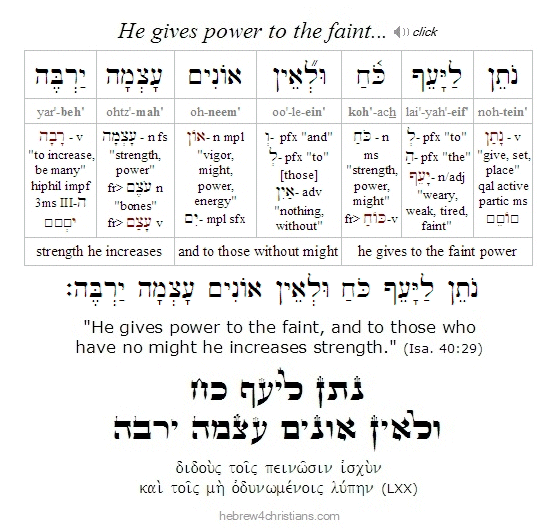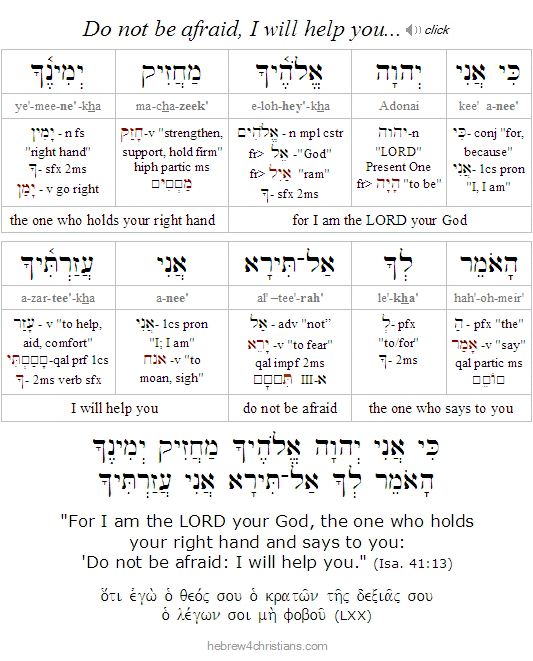|
August 2023 Updates (continued)
Note: If any page content appears to be missing, please refresh the page...
Believing in Love...

[ "The courage to be is the courage to accept oneself in spite of being unacceptable." - Tillich ]
08.04.23 (Av 17, 5783) In our Torah portion for this week (i.e., parashat Eikev) we read: "But now, Israel, what does the LORD your God ask from you ... but to love him with all your heart and with all your soul?" (Deut. 10:12). But how are we able to love God be'khol levavka (בְּכָל־לְבָבְךָ) – "with all our heart" – and be'khol nafshekha (וּבְכָל־נַפְשֶׁךָ) - "with all our soul," apart from healing of the brokenness that makes our hearts divided and sick? That is what the redemption from Egypt was about: we were personally chosen by God, redeemed by his grace, led out from from cruel bondage, only to be led into the desert, away from the world, where we slowly began to understand that we were valued, cared for, and beloved of God. We believed in the possibility of promise, of covenant... Only then could we hear the request from heaven: "Now love Me..." In other words, we can only truly love God by knowing we are beloved by God, and the invitation to love him is a response of his great passion for you (1 John 4:19). Accept that you are accepted in the heart of the Beloved (Eph. 1:4-6).
What the LORD asks from us is humanly impossible, since the human heart is unable to truly love and serve the LORD apart from intervening grace (Eph. 2:1-10). The real miracle of faith is found in a transformed heart. It is never a question of "will power" or the "zeal" of man; no - it is never a question of what I can do but rather what God can do (John 1:13).
We love because He loves us (and we receive and accept that love). It is the strength of his love that keeps you, not the strength of your own... Nevertheless it seems to be the pattern of God's grace to bring affliction and trouble into our lives so that we will begin to seek the Presence of God (i.e., the "troubles of love"). We all are delivered from Egypt by the blood (i.e., the love) of God in the tribulation of hard exile. After all, how many of us came to know the LORD apart from the pain that comes from apprehending our own slavery to inner brokenness? Indeed it is a "severe mercy." Therefore our Savior says: "Truly, truly, I say to you, unless a grain of wheat falls into the earth and dies, it remains alone; but if it dies, it bears much fruit" (John 12:24). The hard "outer shell" of the seed must be broken so that the life of the Spirit can come through... The commandment to love the LORD, then, only finds its voice after we come to faith, after we experience the Holy Spirit's power, indeed, after we are made alive from the dead.
Hebrew Lesson
Deuteronomy 10:12 reading (click for audio):
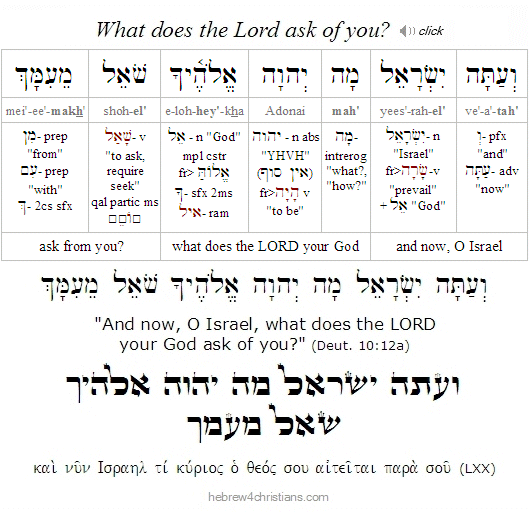 |
Victory in Brokenness...

08.04.23 (Av 17, 5783) Rashi states that the original "wooden ark" (אֲרוֹן עֵץ) mentioned in this week's Torah portion (see Deut. 10:1) was made by Moses and ater was used in Israel's wars. At the outset of a battle, the kohanim (priests) would accompany this "war ark" ahead of the army while the Levites would blast shofars and sing praises to the LORD.
The midrash states that the wooden war ark held the tablets that were shattered after the sin of the Golden Calf, whereas the second ark, that which was made by Betzalel, held the unbroken tablets in the Holy of Holies of the Tabernacle (Exod. 37:1). Perhaps the purpose of bringing the broken tablets to the battle was to remind us that even as we battle against evil, we must do so in humility, conscious of our own inner brokenness, and relying solely upon God's power for the victory...
Grappling with Grace...
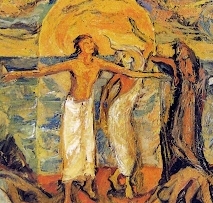
[ "Every now and again, our Lord lets us see what we would be like if it were not for Himself; it is a justification of what He said - "Without Me you can do nothing." That is why the bedrock of Christianity is personal, passionate devotion to the Lord." - Oswald Chambers ]
08.03.23 (Av 16, 5783) SOME PEOPLE SEEM TO THINK THAT "religious observance" is the way of salvation... Whether it's through the practice of a set of prescribed rituals, confessing to a particular creed, or becoming a member of a particular religious "in-group," such people have trouble accepting the idea that God's mercy may be given to those who -- unlike themselves -- haven't "worked for it" and therefore don't really deserve it... They apparently have yet to discover the shocking and tragic truth of their own radical need for healing and therefore they may be scandalized by the idea of God's unconditional love and acceptance. Perhaps they subconsciously believe that love must be earned and therefore they are careful to disguise the truth about who they really are (especially from themselves). They may hide behind ideologies, theologies, ritual acts, church affiliation or attendance, labels, pretenses, excuses, etc. -- all with the aim of being hidden within the crowd -- but they dare not view themselves as individuals who stand entirely dependent upon God alone for help... No, that is too terrifying, because the various self-made props given to shore up one's identity are rendered ineffectual and void before the Holy One.... All our attempts at self-justification invariably create ongoing anxiety within the soul.
I sometimes wonder about people who are obsessed over technical questions regarding "Torah observance" (i.e., dietary law, Sabbath Observance, ritual practices, etc.) Often they seem to be sincere, upright, and zealous for God, but when they're questioned about the ground of their acceptance in light of the Cross of Yeshua, it's often surprising how their lip service regarding the grace of God quickly reverts to talk about God's conditional love and acceptance. They imply, therefore, that the work of the Messiah somehow isn't enough (God forbid) and therefore "salvation" needs to be "completed" or "perfected" through human agency of some kind. Inwardly they think, "Salvation is a gift, yes, but sanctification is our job..." If hard pressed on the question, the self-justifying soul will either resound thunder from Sinai or else will reframe the question in terms of our personal responsibility as the determiner of salvation.
Whenever the question of moral obedience comes up (as it invariably does in these discussions), it is helpful to recall the first and most basic commandment of all, i.e., the commandment to love the LORD with all our heart, soul, mind and strength. THAT is the starting point. Indeed, the very first of the Ten Commandments is אָנכִי יְהוָה אֱלהֶיךָ - Anochi Adonai Eloheykha: "I AM the Lord your God." Without this personal acceptance of the LORD as our God (i.e., our willingness to trust and to love Him), we simply cannot fulfill any of the commandments with the right inward intent. It is because of the LORD's kindness that we are saved (Lam. 3:22). God loves us - despite our sinful state - yet that gloriously liberating truth often offends those who labor under the illusion that they can find favor before the LORD God of Israel through self-effort. Surrendering to God's love is a humbling venture...

The term eikev (עֵקֶב) comes from the root akav (עָקַב, to "take by the heel"), as does the name Ya'akov (יַעֲקב, Jacob), who had "grabbed the heel" of his twin brother Esau while still in the womb of Rebekah. Ya'akov was later renamed Israel in commemoration of his grappling with Malakh Adonai (the Angel of YHVH) at Peniel. The Lord then declared to him, "Your name shall no longer be Ya'akov ("grappler") but Yisrael (יִשְׂרָאֵל), for as a prince (שַׂר, sar) you have striven (שָׂרִיתָ, sarita) with God and with men and have prevailed" (Gen. 32:28). The first occurrence of the root word appears in Genesis 3:15, where the LORD prophesied that although the Redeemer's heel (עָקֵב, akev) would be bruised, the very head (ראשׁ, rosh) of the serpent (satan) would be crushed.
Indeed, directly after the Akedah (the sacrifice of Isaac), the LORD said to Abraham, "in your offspring shall all the nations of the earth be blessed because (עֵקֶב) you have obeyed my voice" (Gen. 22:18). God blessed Abraham and his descendants because he grappled with the Voice of the LORD (YHVH). The great test of the Akedah centered on whether Abraham would accept the unconditional compassion of the LORD or if he would be tempted into seeking self-justification before God as Elohim (i.e, Judge). Ironically enough, Abraham's test was whether he would be "religious" or whether he would heed the compassionate intervention of the LORD... When the White Ram was caught in the thicket and sacrificed in Isaac's place, there was nothing left for Abraham to do other than accept God's gracious gift of love. Surrendering to God's love is the only genuine obedience, after all. "This is the work of God, that you believe in the one God has sent" (John 6:29).
Followers of Messiah are called to do works of healing and righteousness, as it is written: "For we are his workmanship, created in Yeshua the Messiah for good works that God purposed beforehand that we should do" (Eph. 2:10). The sages teach that we shouldn't put off performing acts of righteousness (e.g., tzedakah, visiting the sick, studying Torah, etc.) by thinking we can always do them at a later time; on the contrary, we should always regard the first opportunity presented to us as the only opportunity we might ever get. This is what is meant by the phrase "that I command you this day" (אֲשֶׁר אָנכִי מְצַוֶּה אֶתְכֶם הַיּוֹם). We should never trade a present opportunity for God's perfect will in our lives for a lesser good.... "Repent one day before you die..."
The call to love God with all our heart and soul might seem overwhelming, though we can heed the sages' advice, "It is not incumbent upon you to finish the task; yet you are not free to cease from it" (Avot 2:16). Though the Scriptures list a lot of commandments, all of these can be distilled to the all-encompassing principle of walking in love / לָלֶכֶת בְּאַהֲבָה (Eph. 5:2). "For in the Messiah Yeshua neither circumcision nor uncircumcision counts for anything, but only faith working through love" (Gal. 5:6). We can concentrate on heeding the immediate need of the hour. Walking in light of God's love - while not neglecting the "weightier matters" of the Torah: justice and mercy and faithfulness - ought to be the rule of faith in which we live (Matt. 23:23). This agrees with the New Testament's repeated focus that "love is the fulfillment of the Torah" / הָאַהֲבָה הִיא קִיּוּם הַתּוֹרָה (Rom. 13:10).
Faith and Feelings...

08.03.23 (Av 16, 5783) Why are we sometimes taught that feelings are relatively unimportant to the life of faith? For instance, perhaps you have seen the popular "fact-faith-feeling" train illustration that has been used in many evangelistic tracts in recent years, such as the so-called "four spiritual laws"? The illustration shows a steam engine labeled "fact," followed by a coal car labeled "faith," ending with a caboose labeled "feeling.
 |
The illustration is meant to teach that faith depends first of all on the fact of God's salvation, followed by the decision to believe God's truth, followed (finally) with subjective feelings that may (or may not) arise as a consequence of faith... In other words, in matters of faith we are told not to depend on our feelings, and the implicit message of the illustration is that feelings are inherently unreliable and therefore should not be trusted. "The very act of looking for an emotional experience is a denial of the concept of faith, and whatever is not of faith is sin."
It is evident that emotional experience by itself is an unsure test of truth, especially since there are many who have had powerful emotional experiences based on delusions, though I think it is mistake to relegate the emotional part of our lives to the background (i.e., "the caboose"). After all, we could never know the truth apart from the passion to know the truth, and that implies desire to apprehend the truth about God Himself. Indeed a better illustration might be a three-legged stool, with each leg (i.e., fact, faith, and feeling) necessary for the stool to stand securely upright.... Or perhaps an even better illustration would be that of a chair with four legs: fact, faith, deeds, and feeling, all given equal footing. After all, faith without works is dead, and often it is the practice of faith itself gives life to faith itself...
Of course the reality of God is of first importance, as suggested by the Hebrew word for truth (i.e., emet: אֱמֶת), which begins with the letter Aleph (א), representing the preeminent glory of God. No amount of faith in the world has the power to negate the truth of God, which stands forever, and therefore, any faith in things contrary to God's reality is empty and vain. Nonetheless, God made us emotional people who can express a wide range of feelings, including happiness, love, joy, anger, sadness, fear, delight, and so on. There is "emotional truth" that is part of who we are as human beings, and to deny this, or to otherwise elevate either knowledge or the will above the role of the emotions is to run the risk of becoming "off-balance," heartless, and even cruel. We see this, for example, in intellectual forms of Christianity that merely profess the truth of faith but are devoid of the heart and deeds of the Savior. We also see it in various religious expressions that elevate the role of the will, or having "faith in your faith," to obtain worldly prosperity and success.
The life of the Spirit is known inwardly by means of the "fruit of the Spirit," that is, by means of love, joy, peace, and so on (Gal. 5:22-23). Notice that the fruit of the Spirit is not expressed in intellectual terms at all. It has been said that you can fake the gifts of the Spirit, but not the fruits of the Spirit. The fruit of the Spirit is a matter of the heart, or rather the expression of the new heart (lev chadashah) that God miraculously regenerates within us. This is the "spirit of adoption" within us that cries out, "Abba, Father..." When we recite Shema, we do so be'khol levavkha - with all our heart, with all our soul, with all our might. This is not a passionless declaration, a sterile creed, but a cry from the heart that affirms loyalty to the LORD. Our feelings are important and should be given their voice. As Yeshua Himself said: "Would that you were either cold or hot, but because you are lukewarm - neither hot nor cold - I will spit you out of my mouth" (Rev. 3:15-16).
There is a danger of becoming heartless in our profession of faith, a mere professor who is devoid of the inner life of the Spirit of God. If we tend to think of faith as believing certain things to be true rather than expressing the truth through our hearts and lives, then we may eventually find ourselves unable to adequately express our feelings or to demonstrate empathy for others. Heartless Christianity is devoid of "com-passion," which is to say that it is devoid of the passion of the cross. Our Lord prayed with such fervor that he sweat great drops of blood - and he did so despite his perfect orthodoxy....
By stressing the head over the heart, the vocabulary of the spiritual life is greatly impoverished. Hence many find themselves uncomfortable with emotional expressions of faith, especially expressions of righteous indignation, fear, sadness, or other so-called "dark" emotions. Thank the LORD God for the Psalms, for the heart of David, for they teach us to "own" our emotions and to honestly express them before God. Even though subjective feelings are indeed subject to fluctuation, they are given voice in the songs before the Lord. Feelings are part of the very texture of our lives. How can God ever wipe away our tears when we have refused to cry over this world? How can God console us if we have never felt the tremor of moral outrage over the violence and cruelties of man? Therefore we read "imprecatory" Psalms and understand that God was allowing the psalmist to vent his pain, sadness, and fear before his Heavenly Father. Likewise the Song of Solomon uses the language of human love and passion as metaphors of God's desire for us.... May the LORD our God quicken us and deliver us from numbness of heart... May He help us to awaken to the passion of our souls for Him. May he "afflict" us with hunger and desire for His love and grace... And may we "stir up" our hearts affections and fan the inner flames so that the passion of our lives burns brightly.
 |
The Fear of the LORD...
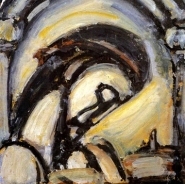
[ "Our life is a short opportunity to say 'yes' to God's love. Our death is a full coming home to that love." - Henri Nouwen ]
08.03.23 (Av 16, 5783) Some people are afraid that God will punish them for their sins, but the true fear of God, yirat shamayim (יִרְאָת שָׁמַיִם), is the tragedy of losing our closeness to Him... This is the fear of the Lord. The sages say that where it is written, "What does the LORD ask of you except to fear the LORD" (Deut. 10:12), we should read instead, "fear with the LORD" (לְיִרְאָה אֶת־יְהוָה), that is, we share his concern that we could forfeit the sanctity of a heart-relationship with Him due to carelessness and sin... We should fear our sin because it blinds us from awareness of God's care and love. The fear of God can therefore be understood as God's fear that we will miss the blessing of intimately knowing him.
The LORD has promised to never leave nor forsake us, though we can choose to turn away from his love and care for our lives... We are not permitted to fear other than that we have no fear of God, for that indeed is a fearful state of soul. May it please God to help each us never to leave nor forsake ourselves by getting lost, by forgetting what is real, and by abandoning hope in the miracle for our lives... May the LORD help us not be grieved, not to hurt ourselves, and never to abandon our hearts to the despair of shame...
Note that the fear of the LORD, or "yirat Adonai" (יִרְאַת יְהוָה), is not the fear of punishment but rather the awe of God's love and intimate concern for your life... It is "techillat chokhah" (תְּחִלַּת חָכְמָה), "the start of wisdom," imparting awareness of the sacred gift of your life, your destiny, and your true end before heaven... If there is a negative aspect to the "fear of the LORD," it may be regarded as the fear of damage to your heart and soul – that is, the fear that sin will blind you to God's passion for you...
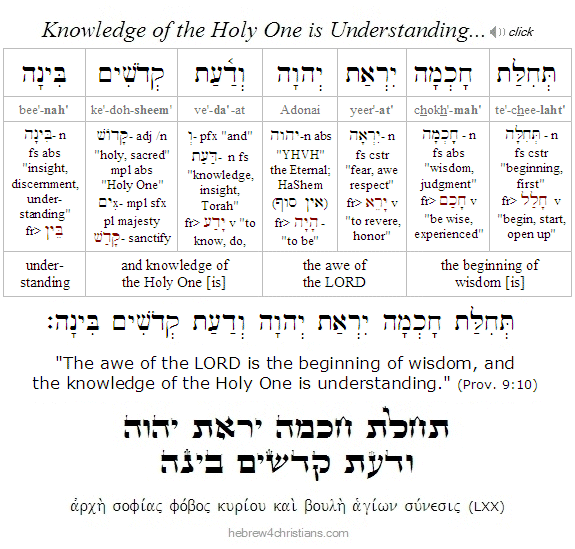 |
Now some may object that all people (including unbelievers) should fear God (i.e., because God might send them to hell), but that appeal only makes sense if we assume the person has some sort of faith - no matter how indistinct or rudimentary... But a guilty conscience does not mean spiritual rebirth, though it may be a step on the way. The doctrine of the wrath of God is an important thing to consider, to be sure, and it is profoundly connected with his holiness and righteous judgment regarding sin, but it is essentially eschatological, a reciprocal response of heaven that ratifies the individual's willing rejection of God's salvation given in Yeshua, the one who mediates God's truth and his mercy (see Psalm 85:10).
For the believer in the One who loves us so much he became the "Son of Man" to die as our substitutionary sacrifice, however, the fear of God is better expressed as reverent awe over his compassion: "That Messiah may dwell in your hearts through faith -- that you, being rooted and grounded in love, may have strength to comprehend with all the saints what is the breadth and length and height and depth, and to know the love of Messiah that surpasses knowledge, that you may be filled with all the fullness of God" (Eph. 3:17-19). Amen. "Work out your own salvation with fear and trembling, lor it is God who works in you both to will and to do of his good pleasure" (Phil. 2:11-12).
For more on this topic, see the parashat Eikev article: "The Fear of the LORD."
 |
Sufficient unto the day...

08.02.23 (Av 15, 5783) In the Gospel of Matthew we read these words of our Lord: "Therefore do not be anxious about tomorrow, for tomorrow will be anxious for itself. Sufficient for the day is its own trouble" (Matt. 6:34). Soren Kierkegaard comments: "If there is no next day for you, then all earthly care is annihilated. When the next day comes, it loses its enchantment and its disquieting insecurity. If there is no next day for you, then either you are dying or you are one who by dying to temporality has grasped the Eternal, either one who is actually dying or one who is really living... The one who rows a boat turns his back to the goal toward which he is working. So it is with the next day. When, with the help of the Eternal, a person lives absorbed in today, he turns his back to the next day. The more he is eternally absorbed in today, the more decisively he turns his back to the next day." Amen. Today is the day of salvation; today may we hear His voice...
"If there is no next day for you, then either you are dying or you are one who by dying to temporality has grasped the Eternal, either one who is actually dying or one who is really living..." [Kierkegaard]
"For he that loses his life will find it..." (Luke 17:33). But how are we to understand this? An old story from the Desert Fathers comes to mind. A visitor came to the Master and was struck by his radiance. Later he spoke to a disciple and asked him for an explanation. The disciple quoted the Master's words, "Truly, truly, I say to you, unless a grain of wheat falls into the earth and dies, it remains alone; but if it dies, it bears much fruit" (John 12:24). Life is a sacred mystery, but death provides the key to unlock its meaning. We can "turn the key" by surrendering ourselves in silent expectation before God. Once we die to life in this world we are set free and empowered to live in joy and gratitude for everything. We experience serenity as we let go in surrender to God's care.
A person must be content to be as he is; a dependent being, as little capable of sustaining himself as of creating himself. If we choose to forget God and look after our own sustenance, then we are overcome with anxiety. It is certainly praiseworthy and pleasing to God when a person works for his food. But if he forgets God, and thinks that he himself is supporting himself, then he becomes burdened with the necessities of life... Worry about making a living, or not making a living, is a snare. In actuality, it is the snare. No external power, no actual circumstance, can trap a person. If a person chooses to be his own providence, then he will go quite ingenuously into his own trap, the wealthy as well as the poor. If he wants to entrench himself in his own plot of ground that is not under God's care, then he is living, though he does not acknowledge it, in a prison. When the farmer shut the door on the wood dove, the wood dove believed himself to be safe, when in fact he was caught. Or to put it another way, he was shut out from the care of Providence and trapped in a life of anxiety. In a spiritual sense he made himself a captive and "trapped himself unto death." (Kierkegaard UPD)
It is the saddest thing of all if a human being goes through life without discovering his need for God. Therefore blessed indeed are the poor in spirit, for theirs is the kingdom of heaven (Matt. 5:3). It is a "blessed fault" to understand our inner poverty, to know anguish of heart, and to be able to abide in God's salvation one day at a time....
The Spirit cries out: "Fear not, for I am with you..." אַל־תִּירָא כִּי עִמְּךָ־אָנִי. What we need most of all is right here, present in this hour, whether we're conscious of it or not. God is with you, even if you feel alone, lost in darkness, unclean, afraid... "Dear Lord Jesus, I don't know who I am, I don't know where I am, and I don't know what I am, but please love me" (prayer of a sufferer from Alzheimer's disease). That's what we need most, to trust that we are safe in God's love, and that's the ultimate message of our atonement in Messiah.
"If a man possessed a letter which he knew, or believed, contained information bearing upon what he must regard as his life's happiness, but the writing was pale and fine, almost illegible - then he would read it with restless anxiety and with all possible passion, in on moment getting one meaning, in the next another, depending on his belief that, having made out one word with certainty he could interpret the rest thereby; but he would never arrive at anything except the same uncertainty with which he began. He would stare more and more anxiously, but the more he stared, less he would see. His eyes would sometimes fill with tears; but the oftener this happened the less he would see. In the course of time, the writing would become fainter and more illegible, until at last the paper itself would crumble away, and nothing would be left to him except the tears in his eyes." - Soren Kierkegaard, Either/Or (excerpt from Parables of Kierkegaard: Thomas Oden, 1978)
Hebrew Lesson
Isaiah 41:13 reading (click for audio):
Seek First God's Kingdom...

[ "Seek first the kingdom of God and his righteousness, and all these things shall be added to you... " - Yeshua (Matt. 6:33). ]
08.02.23 (Av 15, 5783) When we worry, are we not afraid that God will leave us unprotected and vulnerable? Are we not questioning his heart for us? Are we not asking, as the people of Israel once did as they thirsted in desert places: הֲיֵשׁ יְהוָה בְּקִרְבֵּנוּ אִם־אָיִן - "Is the LORD with us or not?" (Exod. 17:7). Indeed, does not the presence of worry within our hearts amount to a confession of our unbelief?
The Scriptures warn us not to "spy after our heart and after our eyes" (Num. 15:39). The Torah mentions the heart first and then the eyes to indicate that the eyes follow the heart. We see as we believe with our heart: "According to your faith be it done unto you." When the spies said, "We are not able to go up (לא נוּכַל לַעֲלוֹת)... for they are stronger than us" (Num. 13:31), they revealed their unwillingness to believe in God's promise, or, to put it another way, they revealed their faith in God's inability to deliver on his word.... Indeed, the Hebrew word for "than us" (מִמֶּנּוּ) can also mean "than Him," suggesting that the spies believed that even God would be unable to uproot the Canaanites. According to their faith, so it was done; by believing that it was impossible, they lost the possibility of God's promise...
Are we truly seeking God "first" or are there other things that have a higher priority in our hearts? Do we wonder if God is to be trusted in the "desert experiences" of our lives? Do we think that God has been unfair to us? Have we sometimes lamented that our way is too hard for us, and more than we can bear? "Lord, I knew you to be a hard man, reaping where you have not sown, and gathering where you have not scattered seed" (Matt. 25:24).
It is possible to misjudge God and misinterpret our relationship with him. "We walk by faith, not by sight." This is true for all people, since every soul lives by faith of some kind or another. Our ability to know him is based on the blessing of the Spirit, not on our own merits. How can we, broken vessels, seek first the kingdom of God, apart from faith in him? Is that not presupposed in all our seeking of the heart? It is faith in God's promises, and faith that God will keep his promises to us, that is the key to seeking first God's kingdom. Those who do not seek do not believe that God is the ultimate concern of their lives.
Faith sees what is possible and refuses to yield to the artificiality of mere appearance. Indeed, appearances are often a test of our courage. We may never know how often a test was given and - just before victory was manifest - the heart grew faint and was lost to fear. "According to your faith be it done to you" is a spiritual principle that applies to everyone. In that sense, it is not that we have faith that matters (since we all do), but whether our faith is grounded in the promises and power of the LORD God of Israel, or something else....
When God told Abram to "get out of your land," he called him to focus on heavenly places – to find his identity there. "Seek ye first the kingdom of God and his righteousness" (Matt. 6:33). The "righteousness of God" is his love, mercy, glory, and goodness. Therefore King David says, אַחַת שָׁאַלְתִּי מֵאֵת־יְהוָה - "One thing have I asked of the LORD, that will I seek after: that I may dwell in the house of the LORD all the days of my life, to behold the beauty of the LORD, and to enquire before his presence" (Psalm 27:4). Likewise, followers of Yeshua no longer find their identity in this world but rather through their spiritual union with the resurrected LORD (Gal. 2:20; 6:14; Eph. 1:3; 2:6)... Therefore we are told to "seek the things that are above (τὰ ἄνω ζητεῖτε) where the Messiah is seated at the right hand of God; focus your thoughts on the things above - not on things here on earth - for you have died, and your life has been hidden (κέκρυπται) with Messiah in God. Then when the Messiah, who is your life, appears, you too will appear with him in glory" (Col. 3:1-4).
Hebrew Lesson
Psalm 16:8 reading (click for audio):
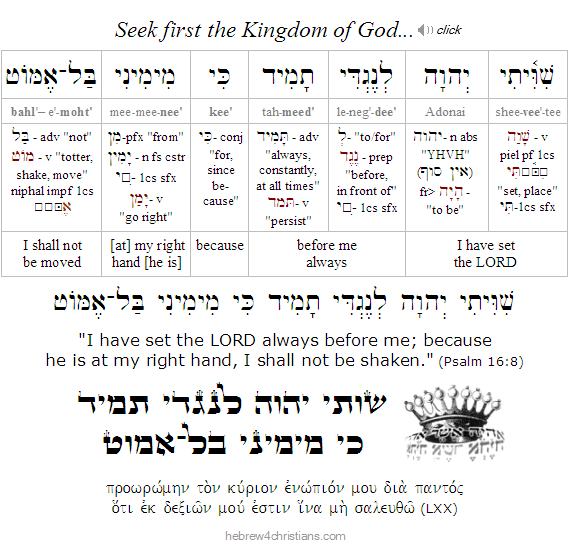 |
Opening your Heart...

[ "Love is the expression of the one who loves, not of the one who is loved. Those who think they can love only the people they prefer do not love at all. Love discovers truths about individuals that others cannot see." - Kierkegaard ]
08.02.23 (Av 15, 5783) Our Torah reading for this week (i.e., parashat Eikev) appeals for us to let go of our hurt and anger: "Circumcise (i.e., cut away) the barriers to your heart, and be no longer unresponsive to love" (Deut. 10:16). The metaphor of a "circumcised heart" (ברית מילה של הלב) symbolizes cutting away the outer covering of the heart so that it is "opened up" and softened to feel once again. God wants us to let go of "hard feelings" so we can experience compassion (i.e., com+passion: "feeling-with") and sympathy for other people... Heart circumcision represents a radical turning away from the insular realm of the self toward the emotional realm of others and God. When our hearts are open, we are able to receive the flow of the Spirit of God and obey the "law of the Messiah" (תּוֹרַת הַמָּשִׁיחַ) to bear one another's burdens (Gal. 6:2).
וּמַלְתֶּם אֵת עָרְלַת לְבַבְכֶם
וְעָרְפְּכֶם לא תַקְשׁוּ עוֹד
oo·mal·tem · et · ohr·lat · le·vav·khem
ve·ohr·pe·khem · loh · tak·shoo · ohd

"Cut away the barriers to your heart,
and be no longer unresponsive to love."
(Deut. 10:16)

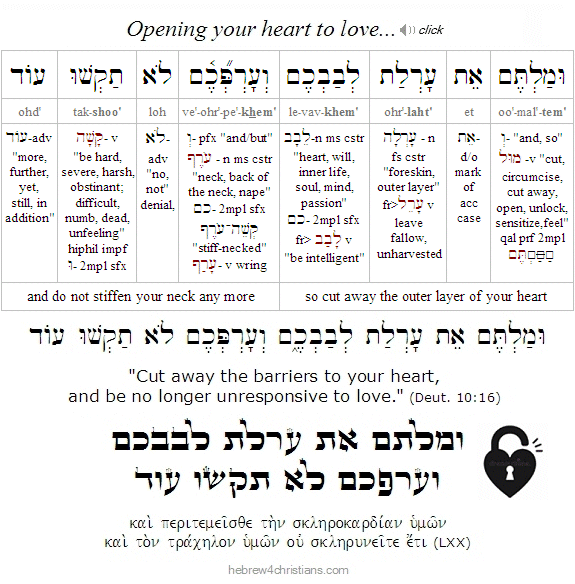
Physical circumcision represents a sign or mark of inclusion; it is a token that you are one of God's family, a Jew, though it is only a sign or token. Spiritual circumcision is an inner operation of the heart that marks you a true child of heaven. It is about your identity and purpose. Therefore we see the paradox that some physical Jews are not spiritual Jews, and some spiritual Jews are not physical Jews (though some are both), as the Apostle Paul said: For no one is a Jew who is merely one outwardly, nor is circumcision outward and physical. But a Jew is one inwardly, and circumcision is a matter of the heart, by the Spirit (ἐν πνεύματι), not by the letter. His praise is not from man but from God (Rom. 2:28-29).
Metaphorically speaking, a heart that is insensitive, indifferent, unfeeling, and callous toward the needs of others is "hard" or "uncircumcised." Often such hardness comes as a result of living in a fallen world. Many wounded people live with "scar tissue" that surrounds their heart, making them feel numb and unwilling to open up and trust others. Their affections have become disordered and they rationalize blaming others or seeking various forms of entitlement. "Turning off your heart" can mean suppressing any positive regard for others (empathy) while nurturing anger and self-righteousness, or it may mean withdrawing from others as a lifeless shell (both approaches vainly attempt to defend the heart from hurt). Although Yeshua always showed great compassion, especially to the wounded and broken in spirit (Isa. 42:3), He regularly condemned the "hardness of heart" (called "sclero-cardia," σκληροκαρδία) of those who resisted his message of healing and love.
A hard heart is closed off and impermeable to love from others, and especially from God. It is a "difficult" (קָשֶׁה) heart, inflexible and sometimes even cruel. Scripture uses various images to picture this condition, including a "heart of stone" (Ezek. 36:26, Zech. 7:12), an "uncircumcised heart" (Jer. 9:26), a "stiff neck" (Deut. 31:27), and so on. Stubbornness is really a form of idolatry, an exaltation of self-will that refuses to surrender to God. If you are wounded and afraid to open your heart in trust to others, ask God for healing...
 |
Teshuvah's Sweet Sorrow...
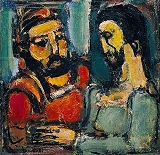
08.01.23 (Av 14, 5783) While it's true that we express sorrow and regret for our sins - we mourn over our lives - this is an essential part of the healing process, with the end result of obtaining comfort from God (Matt. 5:4). Mere regret over sin is not enough, however, since the motive may be from shame (pride) or disappointment over some selfish loss. Esau "repented" with tears, but his wasn't true repentance since he didn't lament the loss of his heart to God's love (Heb. 12:14).
True repentance always leads to healing and life. When the woman from Magdala wept and washed Yeshua's feet with her tears, he said, "I tell you, her sins, which are many, are forgiven -- for she loved much" (Luke 7:44-48). In other words, she was lavish in her love because she deeply regretted that she had missed what was most important, what she desperately needed all along... She saw her sin as blindness to God's love... After all, why would she weep over her sins unless she loved him? And how could she love him unless he first revealed his love to her? (1 John 4:19)
"For grief (λύπη) as intended by God produces a repentance (תְּשׁוּעָה) that leads to salvation, leaving no regret, but worldly grief produces death" (2 Cor. 7:10).
Hebrew Lesson
Click to learn to read the Hebrew text:
 |
<< Return
|











